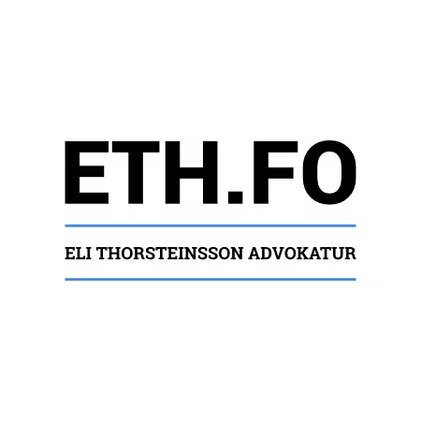Best Tax Increment Financing Lawyers in Faroe Islands
Share your needs with us, get contacted by law firms.
Free. Takes 2 min.
Or refine your search by selecting a city:
List of the best lawyers in Faroe Islands
About Tax Increment Financing Law in Faroe Islands
Tax Increment Financing (TIF) is a public financing method used for subsidizing redevelopment, infrastructure, and other community-improvement projects. In the Faroe Islands, TIF is a relatively new concept adapted to suit the local economic and legal environment. The idea is to capture the future tax benefits of real estate improvements to pay for the present cost of those improvements. This method is particularly useful for stimulating economic development in areas that may not be financially feasible under normal circumstances.
Why You May Need a Lawyer
Navigating the complexities of Tax Increment Financing can be challenging, making legal assistance crucial in many scenarios. Common situations where you might need a lawyer include:
- Understanding the legal framework and requirements for setting up a TIF district.
- Negotiating agreements between developers and municipalities.
- Ensuring compliance with local and national regulations.
- Resolving disputes related to TIF arrangements.
- Advising on potential tax implications and financial structuring.
Local Laws Overview
The Faroe Islands have specific regulations governing Tax Increment Financing, tailored to local economic and institutional conditions. Key aspects include:
- The establishment of TIF districts is subject to approval by local governments.
- Transparency and accountability measures are in place to ensure funds are used appropriately.
- Requirements for community engagement and public hearings to incorporate public interest.
- Legal mechanisms for monitoring and evaluating the impact of TIF-funded projects.
- Regulations on the distribution of incremental tax revenue among various stakeholders.
Frequently Asked Questions
What is the purpose of Tax Increment Financing in the Faroe Islands?
TIF is used to promote economic development in areas that may need revitalization or improvement. It helps finance infrastructure and development projects by using the anticipated increase in tax revenue from the increased property values.
How are TIF districts established?
TIF districts are established by local governments after conducting economic feasibility studies and obtaining necessary approvals. This includes public consultations and ensuring alignment with regional development plans.
Who can benefit from TIF?
Property developers, local municipalities, and the community at large benefit from TIF. Developers gain from reduced costs, municipalities receive improved infrastructure, and communities enjoy better services and increased employment opportunities.
Are there risks involved in TIF?
Yes, risks include the potential for not achieving expected increases in property values, outdated economic assumptions, and financial burdens if development stalls. Careful planning and legal oversight can mitigate these risks.
What are the tax implications of participating in a TIF project?
As TIF involves redirecting future tax revenue, it can affect local tax collections initially. Legal counsel can provide guidance on specific tax implications for particular projects.
Is public involvement required in TIF projects?
Yes, transparency is critical. Public hearings and stakeholder consultations are usually part of the process to ensure community interests are represented and safeguarded.
How long does a TIF district typically last?
The lifespan of a TIF district in the Faroe Islands can vary but often ranges from 15 to 30 years, depending on the scope and nature of the development projects.
What role do developers play in TIF?
Developers are crucial as they execute the projects financed by TIF. They typically work closely with local governments to ensure project goals and community needs are met.
Can existing businesses relocate into TIF districts?
Yes, existing businesses can relocate, often benefitting from improved infrastructure and services, though specific conditions may apply depending on the TIF arrangement.
What happens if a TIF project fails?
If a TIF project does not perform as expected, stakeholders typically reassess strategies, and financial adjustments can be made. Legal guidance is essential in managing such situations.
Additional Resources
For further assistance and information on Tax Increment Financing in the Faroe Islands, consider these resources:
- Local municipal offices for information on TIF district regulations and approvals.
- The Faroese Ministry of Finance for policies regarding economic development initiatives.
- The Faroese Chamber of Commerce for insights into business development opportunities through TIF.
Next Steps
If you require legal assistance with Tax Increment Financing, consider the following steps:
- Research and contact law firms with expertise in Tax Increment Financing and local development law.
- Prepare documentation related to your development project or TIF district and any correspondence with local authorities.
- Schedule consultations to discuss your specific needs and get advice on the best course of action.
Lawzana helps you find the best lawyers and law firms in Faroe Islands through a curated and pre-screened list of qualified legal professionals. Our platform offers rankings and detailed profiles of attorneys and law firms, allowing you to compare based on practice areas, including Tax Increment Financing, experience, and client feedback.
Each profile includes a description of the firm's areas of practice, client reviews, team members and partners, year of establishment, spoken languages, office locations, contact information, social media presence, and any published articles or resources. Most firms on our platform speak English and are experienced in both local and international legal matters.
Get a quote from top-rated law firms in Faroe Islands — quickly, securely, and without unnecessary hassle.
Disclaimer:
The information provided on this page is for general informational purposes only and does not constitute legal advice. While we strive to ensure the accuracy and relevance of the content, legal information may change over time, and interpretations of the law can vary. You should always consult with a qualified legal professional for advice specific to your situation.
We disclaim all liability for actions taken or not taken based on the content of this page. If you believe any information is incorrect or outdated, please contact us, and we will review and update it where appropriate.
Browse tax increment financing law firms by city in Faroe Islands
Refine your search by selecting a city.









